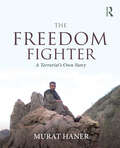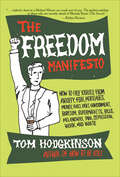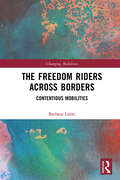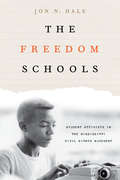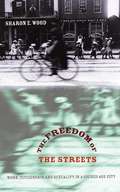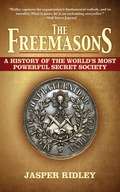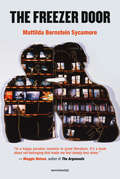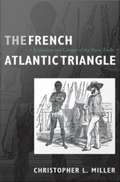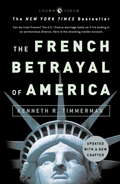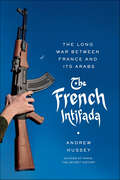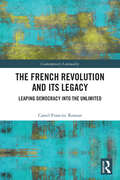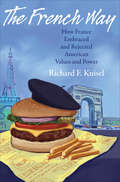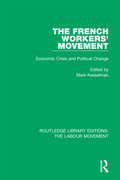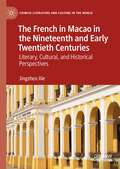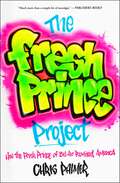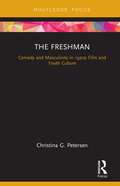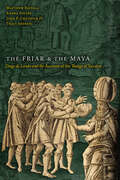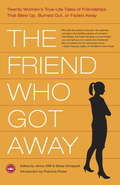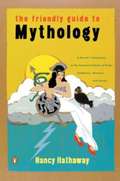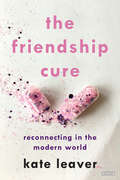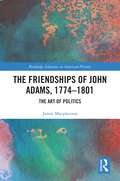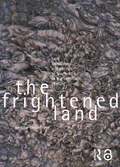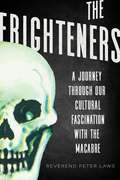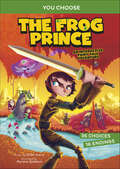- Table View
- List View
The Freedom Fighter: A Terrorist's Own Story
by Murat HanerThe ability of terrorist groups to inflict death and destruction has markedly increased with technological advances in the areas of communication, transportation, and weapon capability. Using these new tools and networks, terrorists now seek to inflict mass casualties worldwide. Given these realities, it is essential to research the factors that underlie a terrorist group’s origins, grievances, and demands. Such insights might help others respond more effectively to insurgencies, especially when military campaigns to capture or kill every terrorist have proven unsuccessful. The Freedom Fighter: A Terrorist’s Own Story explores why so many Kurdish people—especially young adults—join the Kurdistan Workers’ Party (PKK) and conduct terrorist acts. Inspired by the ground-breaking classic, The Jack-Roller: A Delinquent Boy’s Own Story, by Clifford R. Shaw, the author explores the issue of radicalization into terrorist organizations through the life-history method, enabling a PKK terrorist—or “freedom fighter”—to tell his story. Over a five-month period, the author interviewed “Deniz,” a high-level PKK terrorist in a Turkish prison, who during his time in the PKK rose from the lowest level to near the top in terms of terrorist operations. This riveting life history, told in Deniz’s own words, provides unique insights into why someone becomes a “freedom fighter” and what such a life entails. The account provides extensive information on the PKK, including the group’s recruitment, ideological and military training, armed strategies, internal structures and code of ethics, treatment of women, and goals for peace. Deniz’s story not only explains why more Kurdish “freedom fighters” will be recruited to engage in terrorist acts, but also facilitates understanding of how “normal people” can become involved in conflict and organizations that are designated as “terrorist groups.” A foreword by renowned criminologist Francis T. Cullen helps contextualize the material. This book will interest students of criminology, terrorism/counterterrorism, political violence, and security.
The Freedom Manifesto: How to Free Yourself from Anxiety, Fear, Mortgages, Money, Guilt, Debt, Government, Boredom, Supermarkets, Bills, Melancholy, Pain, Depression, Work, and Waste
by Tom HodgkinsonThe author of How to Be Idle, Tom Hodgkinson, now shares his delightfully irreverent musings on what true independence means and what it takes to be free. The Freedom Manifesto draws on French existentialists, British punks, beat poets, hippies and yippies, medieval thinkers, and anarchists to provide a new, simple, joyful blueprint for modern living. From growing your own vegetables to canceling your credit cards to reading Jean-Paul Sartre, here are excellent suggestions for nourishing mind, body, and spirit—witty, provocative, sometimes outrageous, yet eminently sage advice for breaking with convention and living an uncluttered, unfettered, and therefore happier, life.
The Freedom Riders (Cornerstones of Freedom)
by Deborah KentThe "Cornerstones of Freedom" books detail important events in United States history. In this book, the civil rights movement during the 20th century is explored with regard to race relations in the Southern states.
The Freedom Riders Across Borders: Contentious Mobilities (Changing Mobilities)
by Barbara LüthiThe Freedom Riders Across Borders: Contentious Mobilities provides the first comprehensive transnational historical analysis of the Freedom Rides. It explores the transnational history of these social movements and the struggles for the right to mobility and other civil rights in the United States of America, Australia, and Palestine between 1961 and 2011. This book makes a significant contribution to the transnational studies of social movements and the burgeoning field of mobility studies by investigating the specific constellations of mobility as historically and geographically specific formations of movement as well as investigating how the images, ideas and strategies of Freedom Riders were adapted, translated, and moved across time and space. Foremost, this book speaks to the pressing questions of the past and present concerning the politics and inequalities of mobilities impacting different social groups in different ways. From a historical perspective, it gives answers to the intensified interest and questions concerning the dynamics, techniques and "contentious politics" of social movements in a globalized environment. The book details how the question of mobility has come to constitute political conflict and protest over norms, restrictions, and representations. It shows not only that mobility is a differentially accessed resource which shapes and is shaped by political processes, but also that contestation is an equal part of forming mobility. The book identifies vehicles as a mobile site of contestation and, in the context of the Freedom Rides, as a site of strategic political action. In doing so, Lüthi makes a persuasive case for mobility to be given a central place in the study of progressive social movements. As such, this book will be of great interest to researchers in a number of disciplines, including history, geography and sociology.
The Freedom Schools: Student Activists in the Mississippi Civil Rights Movement (Margaret Walker Alexander Series In African American Studies)
by Jon HaleCreated in 1964 as part of the Mississippi Freedom Summer, the Mississippi Freedom Schools were launched by educators and activists to provide an alternative education for African American students that would facilitate student activism and participatory democracy. The schools, as Jon N. Hale demonstrates, had a crucial role in the civil rights movement and a major impact on the development of progressive education throughout the nation. Designed and run by African American and white educators and activists, the Freedom Schools counteracted segregationist policies that inhibited opportunities for black youth. Providing high-quality, progressive education that addressed issues of social justice, the schools prepared African American students to fight for freedom on all fronts. Forming a political network, the Freedom Schools taught students how, when, and where to engage politically, shaping activists who trained others to challenge inequality. Based on dozens of first-time interviews with former Freedom School students and teachers and on rich archival materials, this remarkable social history of the Mississippi Freedom Schools is told from the perspective of those frequently left out of civil rights narratives that focus on national leadership or college protestors. Hale reveals the role that school-age students played in the civil rights movement and the crucial contribution made by grassroots activists on the local level. He also examines the challenges confronted by Freedom School activists and teachers, such as intimidation by racist Mississippians and race relations between blacks and whites within the schools. In tracing the stories of Freedom School students into adulthood, this book reveals the ways in which these individuals turned training into decades of activism. Former students and teachers speak eloquently about the principles that informed their practice and the influence that the Freedom School curriculum has had on education. They also offer key strategies for further integrating the American school system and politically engaging today's youth.
The Freedom of the Streets
by Sharon E. WoodGilded Age cities offered extraordinary opportunities to women--but at a price. As clerks, factory hands, and professionals flocked downtown to earn a living, they alarmed social critics and city fathers, who warned that self-supporting women were just steps away from becoming prostitutes. With in-depth research possible only in a mid-sized city, Sharon E. Wood focuses on Davenport, Iowa, to explore the lives of working women and the prostitutes who shared their neighborhoods. The single, self-supporting women who migrated to Davenport in the years following the Civil War saw paid labor as the foundation of citizenship. They took up the tools of public and political life to assert the respectability of paid employment and to confront the demon of prostitution. Wood offers cradle-to-grave portraits of individual girls and women--both prostitutes and "respectable" white workers--seeking to reshape their city and expand women's opportunities. As Wood demonstrates, however, their efforts to rewrite the sexual politics of the streets met powerful resistance at every turn from men defending their political rights and sexual power.
The Freemasons: A History of the World's Most Powerful Secret Society
by Jasper RidleyWhat did Mozart and Bach, Oscar Wilde and Anthony Trollope, George Washington and Frederick the Great, Winston Churchill and Franklin D. Roosevelt have in common? They were all Freemasons, a subject of endless fascination. To the layman, they are a mysterious brotherhood of profound if uncertain influence, a secret society purported in some popular histories to have its roots in the fabled order of the Knights Templar, or in the mysteries of the Egyptian pyramids. They evoke fears of world domination by a select few who enjoy privileged access to wealth and the levers of power. The secrecy of their rites suggests the taint of sacrilege, and their hidden loyalties are sometimes accused of undermining the workings of justice and the integrity of nations. Though not a mason himself, Jasper Ridley nonetheless refutes many of the outrageous allegations made against Freemasonry, while at the same time acknowledging the masons' shortcomings: their clannishness, misogyny, obsession with secrecy, and devotion to arcane ritual. In this much-needed reassessment, he offers a substantial work of history that sifts the truth from the myth as it traces Freemasonry from its origins to the present day.
The Freezer Door (Semiotext(e) / Native Agents)
by Mattilda Bernstein SycamoreA meditation on the trauma and possibility of searching for connection in a world that enforces bland norms of gender, sexual, and social conformity. <P><P>When you turn the music off, and suddenly you feel an unbearable sadness, that means turn the music back on, right? When you still feel the sadness, even with the music, that means there's something wrong with this music. Sometimes I feel like sex without context isn't sex at all. And sometimes I feel like sex without context is what sex should always be. <P><P>The Freezer Door records the ebb and flow of desire in daily life. Crossing through loneliness in search of communal pleasure in Seattle, Mattilda Bernstein Sycamore exposes the failure and persistence of queer dreams, the hypocritical allure of gay male sexual culture, and the stranglehold of the suburban imagination over city life. Ferocious and tender, The Freezer Door offers a complex meditation on the trauma and possibility of searching for connection in a world that relentlessly enforces bland norms of gender, sexual, and social conformity while claiming to celebrate diversity.
The French Atlantic Triangle: Literature and Culture of the Slave Trade
by Christopher L. MillerThe French slave trade forced more than one million Africans across the Atlantic to the islands of the Caribbean. It enabled France to establish Saint-Domingue, the single richest colony on earth, and it connected France, Africa, and the Caribbean permanently. Yet the impact of the slave trade on the cultures of France and its colonies has received surprisingly little attention. Until recently, France had not publicly acknowledged its history as a major slave-trading power. The distinguished scholar Christopher L. Miller proposes a thorough assessment of the French slave trade and its cultural ramifications, in a broad, circum-Atlantic inquiry. This magisterial work is the first comprehensive examination of the French Atlantic slave trade and its consequences as represented in the history, literature, and film of France and its former colonies in Africa and the Caribbean. Miller offers a historical introduction to the cultural and economic dynamics of the French slave trade, and he shows how Enlightenment thinkers such as Montesquieu and Voltaire mused about the enslavement of Africans, while Rousseau ignored it. He follows the twists and turns of attitude regarding the slave trade through the works of late-eighteenth- and early-nineteenth-century French writers, including Olympe de Gouges, Madame de Stal, Madame de Duras, Prosper Mrime, and Eugne Sue. For these authors, the slave trade was variously an object of sentiment, a moral conundrum, or an entertaining high-seas "adventure. " Turning to twentieth-century literature and film, Miller describes how artists from Africa and the Caribbean--including the writers Aim Csaire, Maryse Cond, and Edouard Glissant, and the filmmakers Ousmane Sembene, Guy Deslauriers, and Roger Gnoan M'Bala--have confronted the aftermath of France's slave trade, attempting to bridge the gaps between silence and disclosure, forgetfulness and memory.
The French Betrayal of America
by Kenneth R. TimmermanCan we trust France? Apparently not. After more than 200 years of shared history and interests, the U.S.-France marriage looks as if it's ending in an acrimonious divorce. Here is the shocking insider account.In the wake of French behavior at the United Nations, where Foreign Minister Dominique de Villepin systematically undermined the efforts of Secretary of State Colin Powell to convince the Security Council to authorize force against Iraq, Americans have at best come to suspect our ally of double dealing, and at worst come to view them as the enemy. Almost daily over the past year, new stories have emerged of how the government of French President Jacques Chirac has sought to undermine the U.S. war on terror, publicly sniping at America and inciting other countries to do the same. What's wrong with France? What's behind their recent perfidy? According to bestselling author Kenneth R. Timmerman, the American public doesn't know half the story. After they read The French Betrayal of America, American anger at France will turn to outrage.Timmerman, who worked as a journalist in France for eighteen years and knows the players on both sides, lifts the veil of Jacques Chirac's scandalous love affair with Saddam Hussein, beginning in 1975, when he took him on a tour of top-secret French nuclear facilities. The French attitude toward the dictator, which seemed to baffle American politicians, was in fact entirely predictable. Put bluntly, it was all about money, oil, and guns. Chirac needed Saddam's oil and Saddam's money, and Saddam needed French weapons and French nuclear technology. Despite this, the relationship between France and America was not only amicable but at times very mutually beneficial. That was until the most recent war on Iraq, where France turned the tables, engaging in dirty diplomacy and helping to sway other European countries to their side. French war coverage was not merely one-sided: It was viciously inaccurate, skewed, and openly anti-American. Timmerman also presents incredible new evidence of France's duplicity, including the fact that the French stood to gain $100 billion from secret oil contracts they had concluded with Saddam Hussein.The French Betrayal of America raises questions of whether the nuclear cooperation agreements still in force with the French today should be canceled in light of France's behavior. Our security interests no longer converge, and our economic systems increasingly appear to be at loggerheads. The war in Iraq harshly exposed French treachery and their desire to do business with the worst of international tyrants, putting their economy, their international standing, and their relationship with a 200-year-old friend in severe jeopardy.gainst the Marsh Arabs in southern Iraq to make their region "safe" for French oil engineers.France helped build Saddam's long-range missiles and nukes.Based on exclusive access to new documents, provided by Iraq to the United Nations -- that French defense companies were key partners in helping Saddam Hussein perfect the long-range missiles that killed U.S. soldiers in Saudi Arabia in 1991 and rained terror onto Israel. Chirac has blocked cooperation on a high-profile terrorism case.France's top counter-terrorism judge was ordered to stop cooperating with the United States in the prosecution of Zacarias Moussaoui despite mounds of documents that would have helped the United States to convict Moussaoui of conspiracy to commit mass murder.France illegally sold U.S. military secrets to Saddam Hussein.A prominent French defense company shipped U.S.-designed laser designator pods to Iraq in the 1980s that compromised the most high-tech weapons in the U.S. arsenal.President Mitterrand, a Socialist, became Ronald Reagan's best ally in Europe.The French Betrayal of America reveals the extent of French strategic and intelligence cooperation with the United States at the peak of the Cold War, in areas that will surprise readers on both sides of the Atlantic. The French ran a key agent inside the KGB, whose "cosmic" reach -- right up to the general ...
The French Intifada: The Long War Between France and Its Arabs
by Andrew HusseyThis provocative look at France’s relationship with the Arab world offers a “bracing mix of journalism and history [that] couldn’t be more timely” (Mitchell Cohen, The New York Times Book Review).To fully understand the social and political pressures wracking contemporary France—and, indeed, all of Europe—we must look beyond domestic issues. Unemployment, economic stagnation, and social deprivation certainly exacerbate the ongoing turmoil in the banlieues. But, as Andrew Hussey demonstrates here, the root of the problem lies in the continuing fallout from Europe’s colonial era.Hussey draws on his deep knowledge of history, literature, and politics as well as his years of personal experience in France, Algeria, and other Arab countries, to provide a nuanced, holistic view of the present situation. In the course of teasing out the myriad interconnections between past and present, The French Intifada shows that the defining conflict of the twenty-first century will not be between Islam and the West but between two dramatically different experiences of the world—the colonizers and the colonized.
The French Revolution and Its Legacy: Leaping Democracy into the Unlimited (Contemporary Liminality)
by Camil Francisc RomanThis book offers an interpretation of the French Revolution and modern democracy, arguing that the revolution gave rise to a democratic power that is liminal by nature, and therefore unlimited, unaccountable on principle, and the basis for a state religion of continuous transformation. It demonstrates these claims by focusing on the universally adulated but little understood sacred motto ‘liberté, egalité, fraternité’, and on the sacrifice and role of Louis XVI in the revolution. Analysing the revolutionary process by which representative democratic government took the shape of political metamorphosis, the book shows that modern democracy does not represent the people but refers to the representation of representation and the existential condition of permanent displacement. The present study will appeal to scholars from across the social, political and human sciences with an interest in the French Revolution, modern democracy, political modernity, contemporary politics and the history of art.
The French Way
by Richard F. KuiselThere are over 1,000 McDonald's on French soil. Two Disney theme parks have opened near Paris in the last two decades. And American-inspired vocabulary such as "le weekend" has been absorbed into the French language. But as former French president Jacques Chirac put it: "The U.S. finds France unbearably pretentious. And we find the U.S. unbearably hegemonic." Are the French fascinated or threatened by America? They Americanize yet are notorious for expressions of anti-Americanism. From McDonald's and Coca-Cola to free markets and foreign policy, this book looks closely at the conflicts and contradictions of France's relationship to American politics and culture. Richard Kuisel shows how the French have used America as both yardstick and foil to measure their own distinct national identity. They ask: how can we be modern like the Americans without becoming like them? France has charted its own path: it has welcomed America's products but rejected American policies; assailed America's "jungle capitalism" while liberalizing its own economy; attacked "Reaganomics'" while defending French social security; and protected French cinema, television, food, and language even while ingesting American pop culture. Kuisel examines France's role as an independent ally of the United States--in the reunification of Germany and in military involvement in the Persian Gulf and Bosnia--but he also considers the country's failures in influencing the Reagan, Bush, and Clinton administrations. Whether investigating France's successful information technology sector or its spurning of American expertise during the AIDS epidemic, Kuisel asks if this insistence on a French way represents a growing distance between Europe and the United States or a reaction to American globalization. Exploring cultural trends, values, public opinion, and political reality, The French Way delves into the complex relationship between two modern nations.
The French Workers' Movement: Economic Crisis and Political Change (Routledge Library Editions: The Labour Movement #21)
by Mark KesselmanFirst published in 1984. This volume brings together many of the foremost French and North American specialists on the French working class movement. Although they differ substantially in their theoretical and ideological orientation, they share a left perspective. Their original essays provide a coherent and comprehensive analysis of the history of the movement, focusing on the constraints and opportunities created by the economic crisis of the 1970s and the political change ushered in by the Socialist Party’s victory in 1981.
The French in Macao in the Nineteenth and Early Twentieth Centuries: Literary, Cultural, and Historical Perspectives (Chinese Literature and Culture in the World)
by Jingzhen XieThe French in Macao in the Nineteenth and Early Twentieth Centuries: Literary, Cultural, and Historical Perspectives investigates the role that Macao played as a meeting place of the East and the West during this period of time and its decline as a Portuguese colony in the eyes of the Europeans. The book provides a comprehensive view of representations of Macao as portrayed by the French. These texts in French have been studied less than Chinese or Portuguese texts on Macao. Overall, the book contributes to the study of colonial history, cultural studies, and China in the late Qing dynasty.
The Fresh Prince Project: How the Fresh Prince of Bel-Air Remixed America
by Chris PalmerA &“thorough, thoughtful, and immensely entertaining&” (Jemele Hill, author of Uphill) cultural history of the beloved nineties sitcom that launched Will Smith to superstardom—The Fresh Prince of Bel-Air—in the vein of Seinfeldia and Best Wishes, Warmest Regards.More than thirty years have passed since The Fresh Prince of Bel-Air premiered on NBC but unlike other family sitcoms of its era, it has remained culturally relevant and beloved by new generations of fans. With fresh eyes on the show in the wake of 2022&’s launch of Bel-Air, a Fresh Prince reboot on NBC&’s Peacock, The Fresh Prince Project brings us never-before-told stories based on exclusive interviews with the show&’s cast, creators, writers, and crew. The Fresh Prince Project is an eye-opening exploration and celebration of a show that not only made Will Smith a household name but helped redefine America&’s understandings of race, sex, parenthood, and class.
The Freshman: Comedy and Masculinity in 1920s Film and Youth Culture (Cinema and Youth Cultures)
by Christina G. PetersenBefore the advent of the teenager in the 1940s and the teenpic in the 1950s, The Freshman (Taylor and Newmeyer, 1925) represented 1920s college youth culture as an exclusive world of leisure to a mass audience. Starring popular slapstick comedian Harold Lloyd, The Freshman was a hit with audiences for its parody of contemporary conceptions of university life as an orgy of proms and football games, becoming the highest grossing comedy feature of the silent era. This book examines The Freshman from a number of perspectives, with a focus on the social, economic, and political context that led to the rise of campus culture as a distinct subculture and popular mass culture in 1920s America; Lloyd’s use of slapstick to represent an embodied, youthful middle-class masculinity; and the film’s self-reflexive exploration of the conflict between individuality and conformity as an early entry in the youth film genre.
The Friar and the Maya: Diego de Landa and the Account of the Things of Yucatan
by Matthew Restall Traci Ardren John F. Chuchiak Amara SolariThe Friar and the Maya offers a full study and new translation of the Relación de las Cosas de Yucatán (Account of the Things of Yucatan) by a unique set of eminent scholars, created by them over more than a decade from the original manuscript held by the Real Academia de la Historia in Madrid. This critical and careful reading of the Account is long overdue in Maya studies and will forever change how this seminal text is understood and used. For generations, scholars used (and misused) the Account as the sole eyewitness insight into an ancient civilization. It is credited to the sixteenth-century Spanish Franciscan, monastic inquisitor, and bishop Diego de Landa, whose legacy is complex and contested. His extensive writings on Maya culture and history were lost in the seventeenth century, save for the fragment that is the Account, discovered in the nineteenth century, and accorded near-biblical status in the twentieth as the first “ethnography” of the Maya. However, the Account is not authored by Landa alone; it is a compilation of excerpts, many from writings by other Spaniards—a significant revelation made here for the first time. This new translation accurately reflects the style and vocabulary of the original manuscript. It is augmented by a monograph—comprising an introductory chapter, seven essays, and hundreds of notes—that describes, explains, and analyzes the life and times of Diego de Landa, the Account, and the role it has played in the development of modern Maya studies. The Friar and the Maya is an innovative presentation on an important and previously misunderstood primary source.
The Friend Who Got Away: Twenty Women's True Life Tales of Friendships that Blew Up, Burned Out or Faded Away
by Jenny Offill Elissa SchappellLosing a friend can be as painful and as agonizing as a divorce or the end of a love affair, yet it is rarely written about or even discussed. THE FRIEND WHO GOT AWAY is the first book to address this near-universal experience, bringing together the brave, eloquent voices of writers like Francine Prose, Katie Roiphe, Dorothy Allison, Elizabeth Strout, Ann Hood, Diana Abu Jabar, Vivian Gornick, Helen Schulman, and many others. Some write of friends who have drifted away, others of sudden breakups that took them by surprise. Some even celebrate their liberation from unhealthy or destructive relationships. Yet at the heart of each story is the recognition of a loss that will never be forgotten. From stories about friendships that dissolved when one person revealed a hidden self or moved into a different world, to tales of relationships sabotaged by competition, personal ambition, or careless indifference, THE FRIEND WHO GOT AWAY casts new light on the meaning and nature of women’s friendships. Katie Roiphe writes with regret about the period in her life when even close friends seemed expendable compared to men and sex. Mary Morris reveals how a loan led to the unraveling of a lifelong friendship. Vivian Gornick explores how intellectual differences eroded the bond between once inseparable companions. And two contributors, once best friends, tell both sides of the story that led to their painful breakup. Written especially for this anthology and touched with humor, sadness, and sometimes anger, these extraordinary pieces simultaneously evoke the uniqueness of each situation and illuminate the universal emotions evoked by the loss of a friend.
The Friendly Guide to Mythology
by Nancy HathawayHow was the world as we know it created? What does it mean to be a hero? Where do we go when we die? Why are flood myths so ubiquitous? Anyone who has pondered these and other questions about humanity's ancient beliefs will be fascinated by The Friendly Guide to Mythology. Focusing on Greek and Roman mythology but including myths from Africa, Asia, Australia, northern Europe, and the Americas, The Friendly Guide to Mythology is filled with compelling stories of gods, goddesses, mortals, and monsters. Beautifully ornamented with photos, line drawings, and quotes, this entertaining guide also includes an A-to-Z listing of the world's most captivating goddesses; profiles of famous writers, collectors, and interpreters of myths; and engaging sidebars. Featuring myths of love, wisdom, and adventure as well as those of violence, jealousy, and pure folly, this accessible collection offers fascinating insight into the human psyche and brings our rich mythological heritage delightfully into focus. .
The Friendship Cure: A Manifesto For Reconnecting In The Modern World
by Kate LeaverThe compelling, fresh, and thought-provoking exploration of friendship—what it is, how to keep it, and why we need it more than ever before Our best friends, Twitter followers, gal-pals, bromances, Facebook friends, and long distance buddies define us in ways we rarely openly acknowledge. But as a society, we are simultaneously terrified of being alone and already desperately lonely. We move through life in packs and friendship circles and yet, in the most interconnected age, we are stuck in the greatest loneliness epidemic of our time. It's killing us, making us miserable and causing a public health crisis. Increasingly, we don’t just die alone; we die because we are alone. What if meaningful friendships are the solution? Journalist Kate Leaver believes that friendship is the essential cure for the modern malaise of solitude, ill health, and anxiety and that, if we only treated camaraderie as a social priority, it could affect everything from our physical health and emotional well being. Her much-anticipated manifesto, The Friendship Cure, looks at what friendship means, how it can survive, why we need it, and what we can do to get the most from it. Why do some friendships last a lifetime, while others are only temporary? How do you “break up” with a toxic friend? How do you make friends as an adult? Can men and women really be platonic? What are the curative qualities of friendship, and how we can deploy friendship to actually live longer, better lives? From behavioral scientists to besties, Kate draws upon the extraordinary research from academics, scientists, and psychotherapists, and stories from friends of friends, strangers from the Internet, and her “squad” to get to the bottom of these and other facets of friendship. For readers of Susan Cain’s Quiet and Elizabeth Gilbert’s Big Magic, The Friendship Cure is a fascinating blend of accessible “smart thinking,” investigative journalism, pop culture, and memoir for anyone trying to navigate this lonely world, written with the wit, charm, and bite of a fresh voice.
The Friendships of John Adams, 1774-1801: The Art of Politics (ISSN)
by Jamie MacphersonThis book presents the first extended analysis of the friendship network of John Adams, forged during his lengthy public career from 1774-1801.While scholars have considered historic friendships, this monograph examines Adams’s friendship network within a generation of revolutionaries. The six friendships explored exemplify the diversity of political interaction: primary friendship (Abigail), intimate confidence (Rush), political alliance (Gerry), emergent rivalry (Jefferson), the politics of personal difference (Mercy Otis Warren), and idolised revolutionary (Samuel Adams). This work positions friendship at the heart of the historian’s craft; reconstructing historic relationships and considering the evolution of each dyad to examine the tensions, candour, intimacy, and forms of alliance in each. Adams’s impassioned epistles present a window into his private ruminations. John Adams’s expectation of friendship changed at each stage of his career: Through 1774-1801, Adams entreated support from friends, debated issues pertaining to politics, diplomacy, and the national interest, sought comfort from intimates, and lamented divisions from former friends. For John Adams, friendship represented the art of politics.This volume will be of value to students and scholars alike interested in American history, political history and social and cultural history.
The Frightened Land: Land, Landscape and Politics in South Africa in the Twentieth Century
by Jennifer BeningfieldAn investigation into the spatial politics of separation and division in South Africa, principally during the apartheid years, and the effects of these physical and conceptual barriers on the land. In contrast to the weight of literature focusing on post-apartheid South Africa, the focus of this book includes the spatial, political and cultural landscape practices of the apartheid government and also refers to contemporary work done in Australia, England and the US. It probes the uncertainty and ambiguity of identities and cultures in post-apartheid society in order to gain a deep understanding of the history that individuals and society now confront. Drawing on a wealth of research materials including literature, maps, newspapers, monuments, architectural drawings, government legislation, tourist brochures, political writing and oral histories, this book is well illustrated throughout and is a unique commentary on the spatial politics of a time of enormous change.
The Frighteners: A Celebration of our Fascination with the Macabre
by Peter LawsThe Frighteners is a bizarrely compelling, laugh-out-loud exploration of societies’ fascination with the dark, spooky, and downright terrifying side of life. The author--self proclaimed “sinister minister”--opens the book by reflecting on how he went from a horror-obsessed atheist to a God-fearing Christian and then reconciled his love of the macabre with his new faith. In the chapters that follow, Laws takes us on a worldwide romp to shine light on the dark corners of our own minds. An American hell house--controversial Christian “haunted houses” that act out the horrors of abortion, drug use, etc.—hosts his reflection on the use of horror in religion. A party in London with real life “vampires” exemplifies modern sexual fascination with the parasitic undead. He goes ghost hunting in an underground barbershop where a murderer used to cut hair. A professor in Denmark who is an expert on the recent Slenderman court case helps him explore the link between technology and the supernatural. In accessible and light-hearted prose, Peter Laws takes us from the dark corners of his mind to the underbelly of various macabre cultures to illuminate society’s preoccupation with death and horror. The Frighteners combines psychology, religious theory, and personal memoir to create a dynamic and fascinating read that is informative and entertaining.
The Frog Prince: An Interactive Fairy Tale Adventure (You Choose)
by Blake HoenaHave you ever wondered how the prince became a frog? Find out what happened from the green guy himself. Or hear the fairy's side of the story. Hop your way through three twisted takes on the classic fairy tale. Will YOU CHOOSE the path to your happily ever after?
